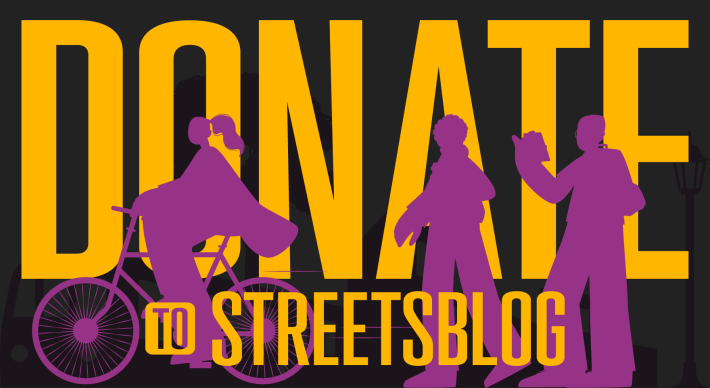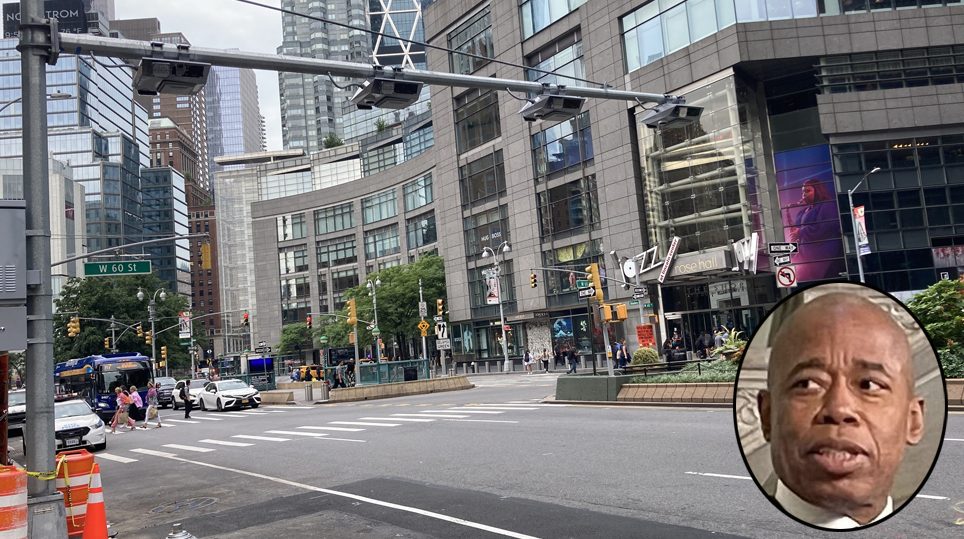
It's time for more community outreach, apparently.
Hours after the Traffic Mobility Review Board announced its $15 peak toll for drivers who choose to use private cars to enter the most transit-rich place in the nation, Mayor Adams said the pricing scheme should merely be the "beginning of the conversation" with "communities to deliberate and to make a determination of who is going to be exempted."
The comments fly in the face of the mayor's claim to be "an advocate of congestion pricing," and contradict the TMRB's decision to intentionally not exempt city workers from paying the toll, a concern that had also been previously raised by the mayor's lone appointee to the panel, John Samuelsen, who resigned in disgust early on Thursday morning.
But it was the mayor's comments that raised the greatest concerns among supporters of congestion pricing. After repeating his longstanding demand that congestion pricing "be done correctly," Hizzoner then branched out into suggesting that the decade-plus-long quest to launch a toll for drivers entering Midtown Manhattan must be revisited entirely.
First, he questioned the state legislation that put the MTA in charge of the toll revenue.
“I think it’s unfortunate that these are New York City streets and we don’t have control over the dollars that are coming from [congestion pricing]," he said at an unrelated presser on Thursday. "I thought that was a big mistake. New York City should have had a major input and these are New York City residents that are actually paying for congestion pricing."
After that, he questioned the proposed toll fees (which are lower than some scenarios initially sought): $15 from 5 a.m. to 9 p.m., dropping to just $3.75 at other times.
“I think the $15 proposal is the beginning of the conversation. Now it’s time to hear from communities, to deliberate, and to make a determination of who is going to be exempted, who is not going to be exempted," he said.
He divided drivers into two classes: “anyone that’s driving into the city for luxury purposes or convenience" vs "those who are there for necessities such as medical treatmeant." The first group, the mayor said should "pay whatever the price is." The second group should not.
"We don’t want to overburden working class New Yorkers," he said.
The MTA's own studies, and census figures, show that very few "working class" New Yorkers commute into or through the central business district.
Activists were quick to jump on the mayor's comments.
"Mayor Adams should make the most of congestion pricing by keeping his promise to millions of bus riders and building more bus lanes and busways to improve the service we depend on," said Riders Alliance spokesman Danny Pearlstein.
"War on Cars" podcast co-host Doug Gordon piled on.
"It's been obvious for a long time that if congestion pricing had not already been the law when he took office, Eric Adams would have opposed it," Gordon posted on Bluesky.
I find this type of concern-trolling particularly disingenuous from a guy who's leading an administration actively stymying much-needed bus lane upgrades. That's the people who should be "taken into account." https://t.co/HCmCbFNi4l
— Second Ave. Sagas (@2AvSagas) November 30, 2023
And Lisa Daglian of the Permanent Citizens Advisory Committee to the MTA said that the mayor is coming in far too late with his concerns, given that "this conversation has been going on since long before legislation was enacted in 2019."
"We think that the outcome of the TMRB deliberations were fair, equitable, reasonable, rational and realistic," she added. "Perhaps they're tweakable, but that's not something you start now. We have to move in a positive direction. We've already seen the results of what happens when you delay congestion pricing — you delay important projects like CBTC that begins the cycle of decay and disinvestment in transit. This is our time to shine and invest in transit."
She said "further look-sees and 'oh-wait's' is "not helpful for anybody."
The mayor's comments came as Samuelsen, a transit workers union head, slammed the MTA for "moronically" failing to add service before initiating congestion pricing.
"The MTA has stubbornly and moronically stuck to its position that the status quo is adequate," Samuelsen wrote in a resignation letter released by the Transport Workers Union of America. "As a result, we have a congestion pricing plan that is all stick and no carrot, a half-way scheme that falls well short of the mark. It will definitely raise revenue. But raising revenue should not have been given priority status over persuading as many New Yorkers as possible to switch from cars to public transit, thus more significantly reducing traffic congestion."
Studies show that with a $15 toll during the peak hours, 17 percent fewer vehicles will enter the central business district, with 9 percent fewer miles driven within it.
Carl Weisbrod, the chairman of the TMRB, pointed out that Samuelsen's letter raised issues that are "largely ... beyond the scope of the TMRB."
He reiterated that "the goal of congestion pricing is to generate the revenue for a capital program for the MTA that will help the vast majority of people who use public transit or expand access to people who can't use it today."
Weisbrod also sought to put a bandage on Mayor Adams's talk of medical exemptions, saying that it was "one of the things" that the TMRB considered. But the panel saw that most people in that population "have coverage that pays for transportation [and] we think that it's going to be fair. ... Those that don't [have the money to pay the toll] have the kind of coverage that would pay for this cost, including Access-a-Ride."
It's not the first time in recent days that Mayor Adams has spoken of reviewing previously made decisions — some made by his own administration — that he doesn't like. On McGuinness Boulevard, for example, Mayor Adams bowed to a late wave of concern from well-funded donors to reject a Department of Transportation safety plan. On Underhill Avenue in Brooklyn, the mayor halted a nearly complete street safety project after two years of engagement and said he wanted DOT staff to start "knocking on doors" to renew its community outreach.
City Hall said that it "deeply" appreciated Samuelsen's "hard work" on the TMRB (though the press shop misspelled Samuelsen's surname in its statement to Streetsblog).
This story will be updated.
— with Kevin Duggan and Dave Colon






